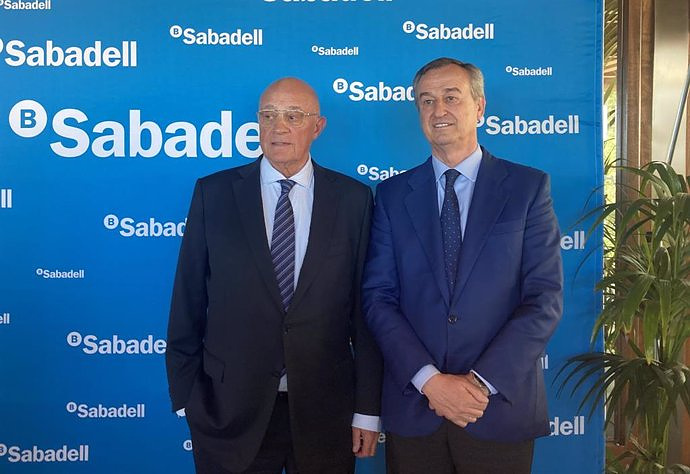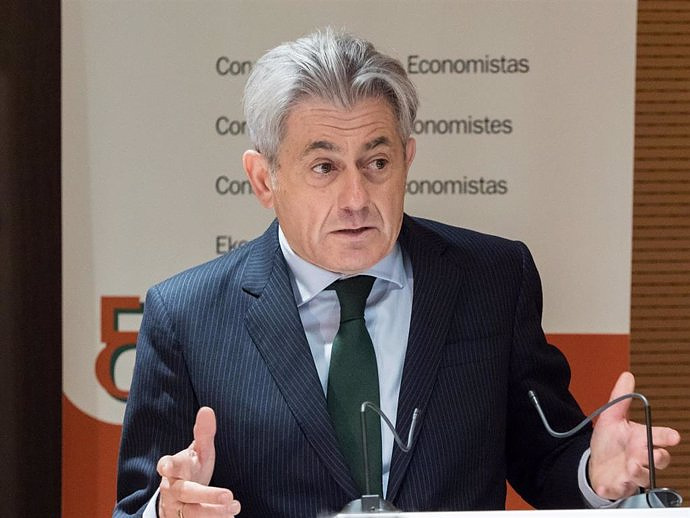He reveals that he could have been a minister and that by offering himself as a candidate in Madrid in 2019, he prevented Iglesias from thinking about resigning
MADRID, 19 Feb. (EUROPA PRESS) -
The spokesman for Unidas Podemos, Pablo Echenique, reproaches the former leader and current leader of Más País, Ínigo Errejón, for maneuvers and a constant struggle for control of the organization, which could even lead to the resignation of former Secretary General Pablo Iglesias and placed the purple formation "on the edge of the abyss" after its split in 2019.
He also regrets that a part of the left contributes to discredit political parties by hoisting citizen platforms, of a markedly "personalist" nature, and which in the end are reflected over time in political formations. And as an example, he gives the former mayor of Madrid Manuela Carmena and Errejón himself when they launched Más Madrid.
This is how he reported in his book 'Memories of a combat pilot' (Arpa publishing house), in which he recounts his life and political career, as well as the main events that have marked Podemos or the formation of the coalition government.
Through these pages, he reveals that, with the agreement between PSOE and Unidas Podemos for the coalition, the possibility of him being one of the ministers and holding the portfolio of Science and Universities was put on the table and that if he had wanted that option it would have materialized. .
"Pedro Sánchez was even considering the possibility of carrying out the necessary adaptations in the Moncloa complex," he points out to indicate that both he and Iglesias ruled it out. And he extols that it was the former vice president who decided out of generosity that the IU coordinator, Alberto Garzón, Yolanda Díaz and the comunes were present in the Executive, although this reduced the representation that corresponded to Podemos.
Throughout the volume, the parliamentary spokesman for the confederal group says that until he was thirty he behaved like a "political idiot" and that at that stage he approached Ciudadanos, a formation in which he was a member for a year (between 2008 and 2009) influenced then for the media climate against nationalism.
He also discusses how he later felt attracted to Podemos from the party's first steps and concludes that many of the internal conflicts were disputes for power "disguised" as political discrepancies. In fact, he affirms that the party suffered "double loyalties, where there were members who prioritized the interests of the old currents (anti-capitalists and errejonism) over the leader or the party organs.
In this way, he reproaches Errejón for taking advantage of the fact that Iglesias was in Brussels as an MEP at the end of 2014 "to gain strength internally in Podemos with the ultimate goal of taking control" of the organization, placing his like-minded members in the Podemos apparatus. . "A party within a party. That's what they called it," he says in a passage of the text.
With this context, Echenique indicates that the citizen assembly known as Vistalegre II, in 2016, visualized the "very violent internal battle" but then "underground" between the two sectors. However, he reproaches that Errejon did not give the fight "honestly" and "frontally" but instead chose the "implausible oblique strategy" of management bodies without opting to lead Podemos.
What's more, Echenique interprets that his ultimate intention was, if he had imposed himself on the 'Pabloist' sector, to provoke the resignation of Iglesias, and call another assembly where, on that occasion, he would have no rival, since no leader can agree to call a project without being able to count on his team and his own roadmap.
"A rather cowardly strategy, but one that could have worked," he later launches to lament that the "operative" of Errejonism conditioned his political force for years despite being defeated in Vistalegre II, until 2019, where in his opinion he secretly mounted and hiding it from Podemos "another party" with Carmena, in reference to Más Madrid.
A maneuver that he defines as a "stab" when he arrived on the fifth anniversary of the formation and with Iglesias on paternal leave, who joined the "disloyal" conclave of eleven regional secretaries to try to force him to "bend his knees" and hand over Podemos to the cleavage.
What's more, the purple leader acknowledges that at the beginning of 2019 Podemos was "on the brink of the abyss" since Iglesias and the current Minister of Equality, Irene Montero, planned to resign and leave politics after not finding a candidate for the Community of Madrid, but they revert when he called them to tell them he was willing to top the list.
"That same day I wrote down in my private calendar: The day I saved Spain", he manifests about this episode to emphasize that they recovered from the "internal betrayals", being key in the motion of no confidence in the PP of 2018 and then get the Government coalition with the PSOE.
On the other hand, the spokesman for Unidas Podemos defends the need for the parties and warns that a part of the left joins the "greedy" temptation to "discredit" them as the right does, in order to "gain space" and preponderate "conceptually sodas" as "platforms or citizen candidacies".
"As a colleague on Twitter recently explained, all these entities, in the end, do not cease to be parties with another name," he deepens to maintain that "many times" these platforms have an internal functioning that is "much more opaque" or "more personal" that later form political formations, as happened with Más Madrid, which today is a "full-fledged" party.
At the same time, he admits that if he could go back, he would not have presented in front of Iglesias in the first citizen assembly and calls it a mistake not to have attended the 2015 municipal elections with the Podemos brand, since it made it difficult for the party to establish itself in the territory and that it is one of their "historical" problems that they are trying to reverse.
And he defends that both the former leader of Podemos and he have always opted for unity and expanding the space for change, but he does not see this attitude in other parties, with refusals from Más Madrid to a unity candidacy in the regional elections or the decision of Commitment not to revalidate the coalition to the 2016 generals.

 Exploring Cardano: Inner Workings and Advantages of this Cryptocurrency
Exploring Cardano: Inner Workings and Advantages of this Cryptocurrency Seville.- Economy.- Innova.- STSA inaugurates its new painting and sealing hangar in San Pablo, for 18 million
Seville.- Economy.- Innova.- STSA inaugurates its new painting and sealing hangar in San Pablo, for 18 million Innova.- More than 300 volunteers join the Andalucía Compromiso Digital network in one month to facilitate access to ICT
Innova.- More than 300 volunteers join the Andalucía Compromiso Digital network in one month to facilitate access to ICT Innova.-AMP.- Ayesa acquires 51% of Sadiel, which will create new technological engineering products and expand markets
Innova.-AMP.- Ayesa acquires 51% of Sadiel, which will create new technological engineering products and expand markets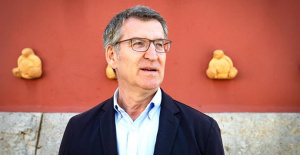 Feijóo, on the UN report: "We are not going to forget either the dictatorship or the terrorist group"
Feijóo, on the UN report: "We are not going to forget either the dictatorship or the terrorist group"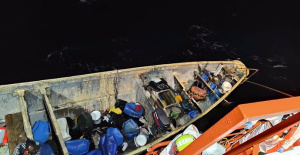 A total of 19,887 migrants have arrived in Spain so far this year, 190% more, 15,982 of them in the Canary Islands
A total of 19,887 migrants have arrived in Spain so far this year, 190% more, 15,982 of them in the Canary Islands C-LM, Extremadura or Madrid, among the CC.AA that announce the creation of Bullfighting Awards after the suppression of Culture
C-LM, Extremadura or Madrid, among the CC.AA that announce the creation of Bullfighting Awards after the suppression of Culture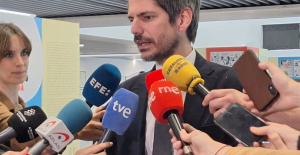 Urtasun faces criticism for suppressing the Bullfighting Prize: "I think they represent a minority"
Urtasun faces criticism for suppressing the Bullfighting Prize: "I think they represent a minority" How Blockchain in being used to shape the future
How Blockchain in being used to shape the future Not just BTC and ETH: Here Are Some More Interesting Coins Worth Focusing on
Not just BTC and ETH: Here Are Some More Interesting Coins Worth Focusing on Faraday UPV presents the 'Origin' rocket to exceed 10 km of flight: "It is the beginning of the journey to space"
Faraday UPV presents the 'Origin' rocket to exceed 10 km of flight: "It is the beginning of the journey to space" The Generalitat calls for aid worth 4 million to promote innovation projects in municipalities
The Generalitat calls for aid worth 4 million to promote innovation projects in municipalities UPV students design an app that helps improve the ventilation of homes in the face of high temperatures
UPV students design an app that helps improve the ventilation of homes in the face of high temperatures Ivace and promotes a less invasive device for the early detection of prostate cancer
Ivace and promotes a less invasive device for the early detection of prostate cancer A million people demonstrate in France against Macron's pension reform
A million people demonstrate in France against Macron's pension reform Russia launches several missiles against "critical infrastructure" in the city of Zaporizhia
Russia launches several missiles against "critical infrastructure" in the city of Zaporizhia A "procession" remembers the dead of the Calabria shipwreck as bodies continue to wash up on the shore
A "procession" remembers the dead of the Calabria shipwreck as bodies continue to wash up on the shore Prison sentences handed down for three prominent Hong Kong pro-democracy activists
Prison sentences handed down for three prominent Hong Kong pro-democracy activists ETH continues to leave trading platforms, Ethereum balance on exchanges lowest in 3 years
ETH continues to leave trading platforms, Ethereum balance on exchanges lowest in 3 years Investors invest $450 million in Consensys, Ethereum incubator now valued at $7 billion
Investors invest $450 million in Consensys, Ethereum incubator now valued at $7 billion Alchemy Integrates Ethereum L2 Product Starknet to Enhance Web3 Scalability at a Price 100x Lower Than L1 Fees
Alchemy Integrates Ethereum L2 Product Starknet to Enhance Web3 Scalability at a Price 100x Lower Than L1 Fees Mining Report: Bitcoin's Electricity Consumption Declines by 25% in Q1 2022
Mining Report: Bitcoin's Electricity Consumption Declines by 25% in Q1 2022 Oil-to-Bitcoin Mining Firm Crusoe Energy Systems Raised $505 Million
Oil-to-Bitcoin Mining Firm Crusoe Energy Systems Raised $505 Million Microbt reveals the latest Bitcoin mining rigs -- Machines produce up to 126 TH/s with custom 5nm chip design
Microbt reveals the latest Bitcoin mining rigs -- Machines produce up to 126 TH/s with custom 5nm chip design Bitcoin's Mining Difficulty Hits a Lifetime High, With More Than 90% of BTC Supply Issued
Bitcoin's Mining Difficulty Hits a Lifetime High, With More Than 90% of BTC Supply Issued The Biggest Movers are Near, EOS, and RUNE during Friday's Selloff
The Biggest Movers are Near, EOS, and RUNE during Friday's Selloff Global Markets Spooked by a Hawkish Fed and Covid, Stocks and Crypto Gain After Musk Buys Twitter
Global Markets Spooked by a Hawkish Fed and Covid, Stocks and Crypto Gain After Musk Buys Twitter Bitso to offset carbon emissions from the Trading Platform's ERC20, ETH, and BTC Transactions
Bitso to offset carbon emissions from the Trading Platform's ERC20, ETH, and BTC Transactions Draftkings Announces 2022 College Hoops NFT Selection for March Madness
Draftkings Announces 2022 College Hoops NFT Selection for March Madness






